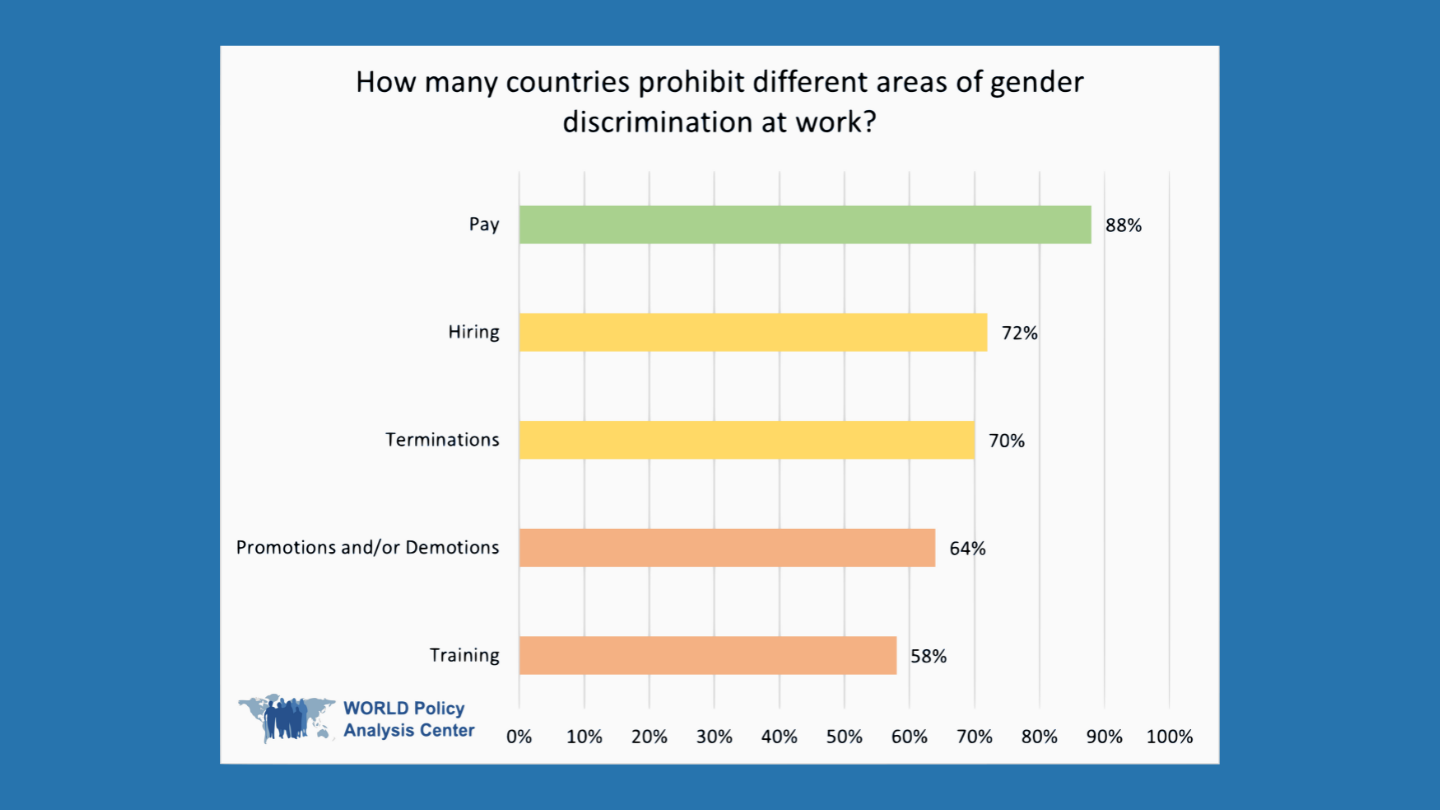Newswise — The United States is falling behind the rest of the world in supporting fathers and caregivers of older adults, new UCLA research finds — and women’s engagement in the economy is stagnating as a result.
Today, the WORLD Policy Analysis Center (WORLD) at UCLA, launched “Equality within Our Lifetimes,” the most comprehensive analysis to date of laws and policies related to gender equality in all 193 U.N. member states. While the U.S. performs well in some areas, it has become even more of an outlier when it comes to care.
Since 1995, the new research shows, the share of countries globally providing paid leave to fathers of infants has nearly tripled. In some regions, progress has been even faster: the number of African Union countries providing paid leave to fathers more than quadrupled from 1995 to 2022. Altogether, 63% of countries worldwide, 78% of high-income countries, and 100% of countries in the European Union (EU) guarantee paid leave to dads. Meanwhile, the U.S. fails to provide any paid leave nationally.
“The growth in paid leave for fathers around the world represents a powerful recognition that increasing gender equality at home is essential for achieving gender equality at work,” said Dr. Jody Heymann, a UCLA distinguished professor of public health and public policy, and founding director of WORLD. “Research shows that when men take leave following the birth of a baby, parents share household work more equally, women are more likely to stay in the workforce, and women’s earnings increase. Moreover, men feel the benefit to their relationship with their children through early and later years."

The U.S. also falls short when it comes to supporting workers caring for adult family members and older children. Although Department of Labor statistics show that over 40 million U.S. adults are providing care to a family member over 65, the U.S. provides no leave to care for a seriously ill parent, unlike 74% of E.U. countries. Likewise, while 78% of E.U. countries guarantee leave to care for an ill spouse, the U.S. offers none.
These gaps hurt women the most. “Women continue to shoulder the majority of unpaid caregiving for family members of all ages,” said WORLD Senior Legal Analyst Aleta Sprague. “When leave to meet these needs is unavailable, as in the U.S., women are more likely than men to leave their jobs, reduce their hours, or step back from leadership positions – all of which reinforce broader gender inequalities in earnings and influence."
The U.S.’s lack of support for fathers and workers caring for adult family members compounds its longstanding inaction on paid maternity leave: unlike 96% of the world’s countries, the U.S. has yet to adopt paid leave for mothers of infants. Moreover, in its failure to provide leave, the U.S. has become more isolated over time.
“When we began tracking leave policies globally in 2000, 18 countries still hadn’t passed leave for mothers of infants,” said WORLD Principal Research Analyst Amy Raub. “Today, it’s only the U.S., Papua New Guinea, and five small island nations that still have no paid leave policy. The U.S.’s continued failure to adopt paid leave for either parent is setting women back and hurting our economy."
From 2000 to 2021, among the 36 countries that were members of the OECD throughout that period, the U.S. dropped from 7th to 28th on women's labor force participation — and past studies have found that lack of paid leave is a major contributor.
“Equality within Our Lifetimes” is based on over a decade of research by the WORLD Policy Analysis Center, the world’s largest independent data center measuring laws and policies in all countries worldwide. WORLD’s multilingual, interdisciplinary team examined laws and policies in all 193 U.N. member states and rigorously analyzed the impacts of legal changes around the world. Alongside an open-access book published through U.C. Press, the launch includes over 100 new global maps, open-access policy data for all 193 countries, and policy briefs available in three languages.
The study’s launch comes just weeks after U.S. policymakers and advocates commemorated the 30th anniversary of the Family and Medical Leave Act (FMLA), the 1993 law guaranteeing workers 12 weeks of unpaid leave for serious caregiving needs. According to WORLD’s research, however, the law’s eligibility requirements exclude over half of private sector workers and widen gaps in leave access across race, gender, and socioeconomic status.
“At the time it was passed, the FMLA was a landmark piece of legislation for the U.S, but since then, progress from other countries has left the U.S. in the dust. The FMLA as it stands today is woefully inadequate, excluding far too many households from being able to take time to meet critical care needs,” said Sprague. “Evidence from 193 countries demonstrates that strong, inclusive paid leave policies for both parents of infants and other caregivers are readily achievable.”
Moreover, the benefits of enacting leave would be substantial for women, men, families, and the broader economy alike, the study shows.
“Estimates from multiple sources show that if we achieved full gender equality in the economy, annual GDP would rise by several trillion dollars,” Heymann said. “The question is not whether we can afford to pass paid leave for all, but how we could afford not to."
-----------------------------------------------------------------------------------------------------------------------------------------------------------
About the WORLD Policy Analysis Center (WORLD) at UCLA
The WORLD Policy Analysis Center (WORLD) at UCLA is the largest independent global policy data center, capturing over 2,500 social, economic, health, and environmental quantitative legal indicators for all 193 U.N. countries. With an international, multilingual, and multidisciplinary team, WORLD collects and analyzes information on every country’s rights, laws, and policies in areas including education, health, adult labor and working conditions, child labor, poverty, constitutional rights, discrimination, childhood, gender, marriage, families, aging, and disability.
MEDIA CONTACT
Register for reporter access to contact detailsCITATIONS
“Equality within Our Lifetimes,”
